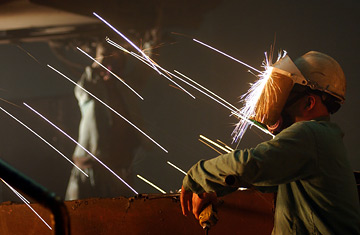
A worker is struck in the face with sparks from molten steel flowing into casts
Think of mergers and you typically imagine captains of industry egged on by big bankers. But this week's most significant consolidation is happening on the other side of the working world: between labor unions. The United Steelworkers (USW), America's largest private-sector union, is joining up with Unite, Britain's largest national union, to form the world's first transatlantic union. The deal, set to be inked on Wednesday at the Steelworkers' International Convention in Las Vegas, will create the grandiosely named Workers Uniting: The Global Union. Says USW President Leo W. Gerard: "We're creating a new union here, with a constitution, a mission and staff."
Both parties to the fusion have grown big through mergers at home. Steelworkers currently only make up a fifth of USW's 1.2 million members, who work in such disparate sectors as mining, oil, paper, health care and security. Unite is the result of the consolidation last year of two other big unions, and its 2 million members also toil in a wide range of industries including aerospace, steel, brewing and transportation.
The Steelworkers and Unite will remain largely autonomous, national entities, but they'll be guided by an Anglo-American umbrella leadership that will coordinate common policy. Gerard and Unite General Secretary Derek Simpson will likely serve as co-chairmen.
The rationale for the ocean-spanning super union is obvious and ubiquitous: globalization. Most of the companies that labor deals with are globe-straddling multinationals, yet unions remain national organizations. That's widely considered one reason why organized labor has endured decades of decline in overall membership and in clout. Thomas A. Kochan, co-director of the Institute for Work and Employment Research at the Massachusetts Institute of Technology, is convinced the Steelworkers and Unite will make the merger work, he says, "but it will take time; it's uncharted territory." He points out that since t he USW already has a significant presence in Canada, as well as a small membership in the Caribbean, "it's got some experience in what it means to cross a border."
The question now is what can it do now that it's joining up even more international workers. The power to negotiate individual bargaining contracts will remain with USW and Unite, mainly because of differing national and internal laws and regulations. But Gerard says there's a host of issues common to both unions that will keep the collective leadership busy. In sectors including steel, paper and oil, for example, both unions deal with some of the same companies. The merged union will be better able to ensure that a company can't reject defined benefits in one country that it's already agreed to in the other. Other issues more suited to a global union include international trade, workers' rights in the developing world and transnational shifts in employment. The merger also gives labor more muscle for dealing with bodies like the World Trade Organization, the European Commission and the increasing number of global forums on issues like climate change, he adds. "It allows them to create a position as an international player who gets noticed."
In some respects, the USW and Unite are marching to echoes of drumbeats past. Trade unionism has from its earliest days considered itself a global movement, albeit one organized at national levels. Certainly, a number of unions — including the Steelworkers — have formed alliances with foreign counterparts. And there are already several world-spanning labor bodies, including the International Trade Union Confederation and the International Metalworkers' Federation. For that reason, Richard Hyman, a professor of industrial relations at the London School of Economics, is skeptical the merger will work or is necessary. While unions need to better coordinate efforts on a global scale, he says, they would be better off working through existing federations. MIT's Kochan, on the other hand, calls those groups "very weak ... perpetual debating societies" with no decision-making power." Hyman doesn't disagree, but says that's mainly because they're short of resources: "Unions are often reluctant to put their money where their mouth is."
While Workers Uniting's transatlantic architecture is unique, it's not truly a global entity, at least not yet. But Gerard says it's already heard from unions in Eastern Europe, Latin America and Australia interested in joining forces. "We're drafting the constitution to keep that issue open," he says. Still, even if the logic of a global union is unassailable, bigger isn't always better. Just check out the history of big business, where even the friendliest and most compelling of mergers often end in tears. Workers of the world, unite, indeed. But don't expect a revolution.
